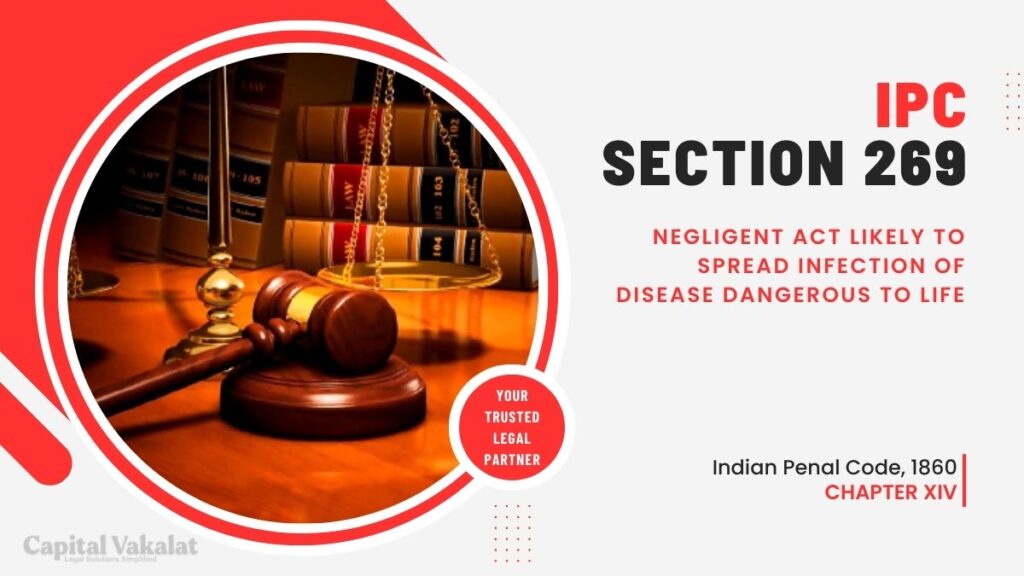Section 269 of the Indian Penal Code (IPC) deals with negligent acts likely to spread infections of diseases dangerous to life. It is a crucial legal provision aimed at safeguarding public health and safety by holding individuals accountable for their actions when they negligently contribute to the spread of life-threatening diseases.

In this article, we will delve into the details of Section 269 IPC, understanding what constitutes a negligent act in the context of disease transmission, its legal implications, and the significance of the term “dangerous to life.”
Understanding Negligent Acts in the Context of Disease Transmission
Negligence, in legal terms, refers to the failure to exercise the care and caution expected of a reasonable person in a particular situation. When it comes to the spread of infectious diseases, a negligent act can encompass a wide range of actions that contribute to the transmission of disease. These actions can include knowingly or unknowingly spreading diseases through physical contact, failure to adhere to health and safety guidelines, or willfully disregarding measures in place to prevent disease transmission.
Elements of Section 269 IPC
Section 269 IPC outlines certain essential elements that must be proven to establish an offense. These elements typically include:
- Negligent Act: The accused must have committed a negligent act.
- Infection of Disease: The negligent act should result in the infection of a disease.
- Dangerous to Life: The disease in question must be dangerous to life.
The Significance of “Dangerous to Life”
One critical aspect of Section 269 IPC is the term “dangerous to life.” The law specifies that the disease involved must be dangerous to life. This means that it’s not just any disease but one that can pose a severe risk to an individual’s life. Courts typically consider diseases like tuberculosis, COVID-19, and other highly contagious and potentially fatal illnesses under this provision.
Examples of Negligent Acts Covered by Section 269 IPC
To better understand the practical application of this section, let’s explore a few examples of negligent acts that could lead to charges under Section 269 IPC:
- A person knowingly conceals their COVID-19 positive status and continues to interact with others, thereby spreading the virus.
- A restaurant owner fails to maintain proper hygiene and food safety standards, leading to foodborne illnesses among customers.
- A healthcare professional administers injections with unsterilized needles, leading to the transmission of blood-borne diseases.
Legal Consequences and Penalties
Violating Section 269 IPC can lead to serious legal consequences. The penalties can vary depending on the severity of the offense and whether it has resulted in injuries or fatalities. Those found guilty of such negligence may face fines, imprisonment, or both.
Recent Cases and Precedents
Recent legal cases and precedents related to Section 269 IPC highlight its continued relevance in ensuring public health and safety. Courts have consistently upheld the importance of holding individuals accountable for their negligent acts, particularly when they jeopardize public health.
Importance of Public Health and Safety
Section 269 IPC plays a vital role in safeguarding public health and safety. It acts as a deterrent against individuals who may act recklessly and endanger the lives of others. In times of pandemics and health crises, the implementation of this section becomes even more crucial.
The Role of Individuals in Preventing the Spread of Infectious Diseases
Preventing the spread of infectious diseases is a collective responsibility. Individuals must be aware of their actions and take necessary precautions to protect themselves and others. Adhering to public health guidelines, getting vaccinated, and practicing good hygiene are some of the key steps in this endeavor.
Conclusion
In conclusion, Section 269 IPC addresses the negligent acts that can lead to the spread of dangerous diseases, emphasizing the significance of public health and safety. It serves as a legal tool to hold individuals accountable for their actions and deter reckless behavior. As responsible members of society, it’s our duty to prevent the spread of infectious diseases by following health guidelines and prioritizing the safety of all.
Frequently Asked Questions
Can a person be charged under Section 269 IPC for unknowingly spreading an infectious disease?
Yes, the law encompasses both knowing and unknowing transmission of diseases. Negligence can include not taking reasonable precautions to prevent the spread of disease.
What are the typical penalties for violating Section 269 IPC?
Penalties vary based on the severity of the offense and its consequences but can include fines, imprisonment, or a combination of both.
How can individuals contribute to preventing the spread of infectious diseases?
Individuals can contribute by following health guidelines, getting vaccinated, practicing good hygiene, and being aware of their actions to prevent disease transmission.
Is Section 269 IPC only applicable during pandemics, or is it relevant at all times?
Section 269 IPC is relevant at all times and is not limited to pandemics. It applies whenever negligent acts lead to the spread of dangerous diseases.